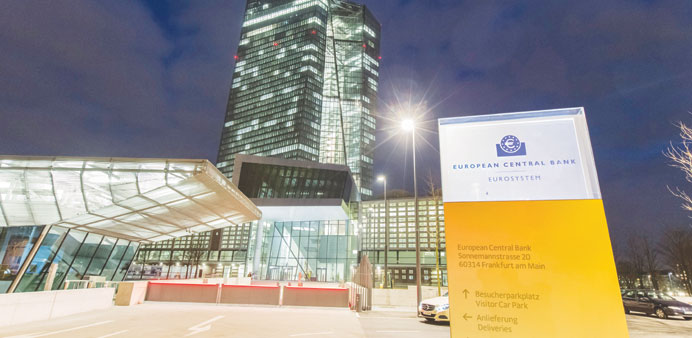An illuminated sign for the European Central Bank headquarters stands outside the main building in Frankfurt. The ECB is seeking to foster lending in the euro area as the crisis in Greece roils markets across the region.
Bloomberg/London
The European Central Bank (ECB)added state-backed company debt to the list of assets eligible for purchase under its €1.1tn ($1.2tn) quantitative easing (QE) programme, widening efforts to spur growth in the region.
Italian utilities Enel SpA, Snam SpA and Terna SpA - Rete Elettrica Nazionale were among borrowers whose debt may now be purchased, according to the ECB’s website. Bonds of those companies rallied, according to data compiled by Bloomberg.
The central bank is seeking to foster lending in the euro area as the crisis in Greece roils markets across the region. While the Frankfurt-based ECB has acquired more than €295bn of covered bonds, asset-backed securities, agency and sovereign debt, it had refrained from purchases of corporate bonds, where liquidity is tight.
“Mario Draghi is overstepping the mark,” said Jeroen Van Den Broek, the head of developed markets credit strategy and research at ING Bank NV in Amsterdam. “These aren’t euro agencies. They are companies that have some form of government ownership. QE should stay well away from the euro corporate bond market because it’s already very squeezed and illiquid. QE will make that worse.”
An ECB spokesman confirmed the borrowers added to its list of eligible entities include public-sector non-financial companies.
The central bank intends to use its asset-purchase programme to buy €60bn a month of securities through at least September 2016 to revive inflation. It has previously said the list of eligible agencies may be expanded if needed for monetary-policy reasons.
Enel’s bonds jumped, with the company’s €750mn of 5.25% notes due May 2024 rising 2.6 cents on the euro to 127 cents, the biggest increase in more than five years, according to data compiled by Bloomberg.
Enel, Snam and Terna are all less than 30% owned by the Italian government, according to data compiled by Bloomberg. The companies were among 13 new entities from across the euro area added to the ECB’s purchase list yesterday, which also included borrowers where the state has a larger ownership stake.
Snam’s €1bn of 5.25% bonds maturing in September 2022 climbed 1.8 cents on the euro to 125 cents, the biggest increase since they were sold in September 2012, Bloomberg data show. Terna’s €800mn of 4.9% securities due October 2024 rose 2.1 cents on the euro to 125 cents, the biggest jump since August 2011, the data show.
The ECB’s announcement yesterday has taken the market completely by surprise, said Van Den Broek. Purchases of company bonds will push investors into riskier assets, he said.
Executive Board member Benoit Coeure said in May that the central bank may “frontload” QE purchases before the European summer holiday period, when liquidity is lower.
He and colleague Peter Praet have also said officials have the flexibility to adjust the program to curb any unwarranted euro-area market volatility related to Greece’s financial crisis.
“So far purchases are around state-owned corporates, but may extend further to high-quality investment-grade names,” said Alberto Gallo, head of macro credit research at Royal Bank of Scotland Group Plc in London. The expansion shows the ECB is “ready to intervene closer to the real economy.”
The 13 new borrowers added to the ECB’s purchase list have about 66bn euros of bonds outstanding, according to Hyung- Ja de Zeeuw, senior European credit sector strategist at ABN Amro in Amsterdam.
Among the new additions were OeBB Infrastruktur, which builds infrastructure for Austria’s railway network, and Infraestruturas de Portugal, which manages road and rail networks. Both are fully state owned. The new borrowers were classified by the ECB as agencies. This has allowed the central bank to add corporate debt to its purchases, which have previously centred on bank and government securities, said Bernd Volk, head of European covered and agency bond research at Deutsche Bank.
“With this new bond list, other countries will probably suggest further corporates be made eligible,” Volk said.

